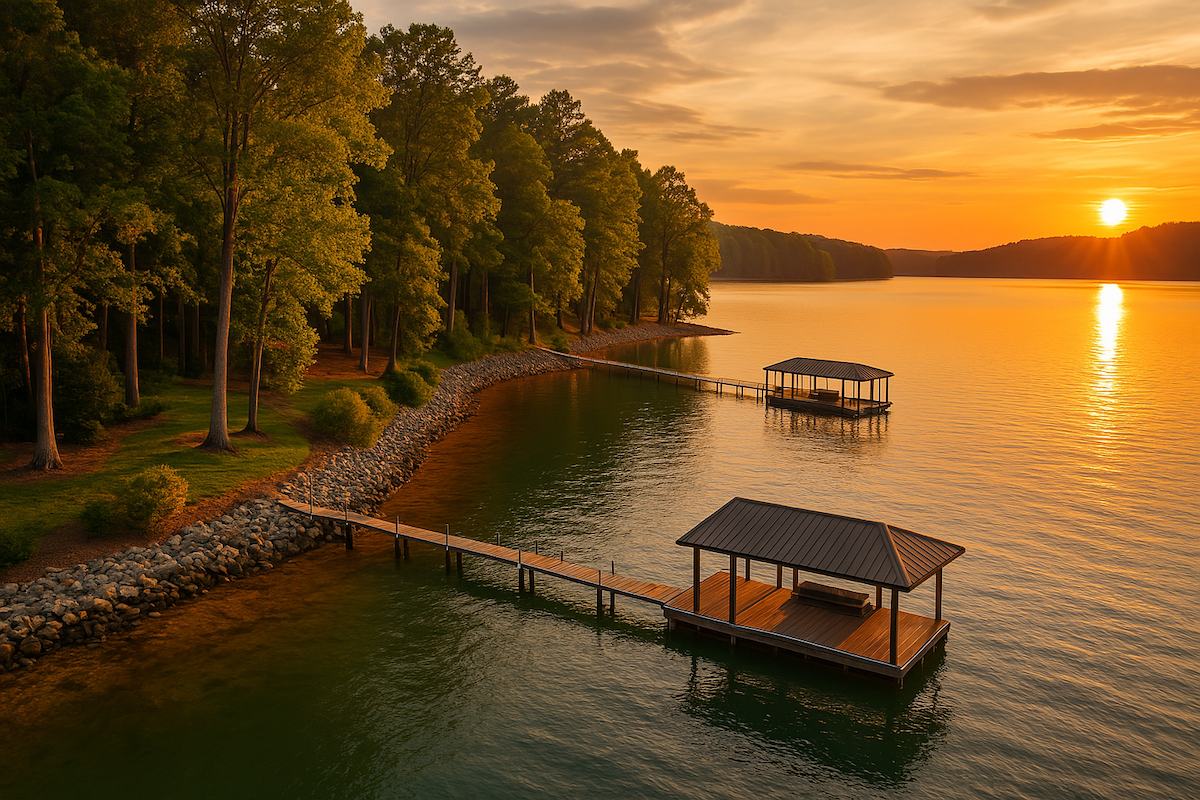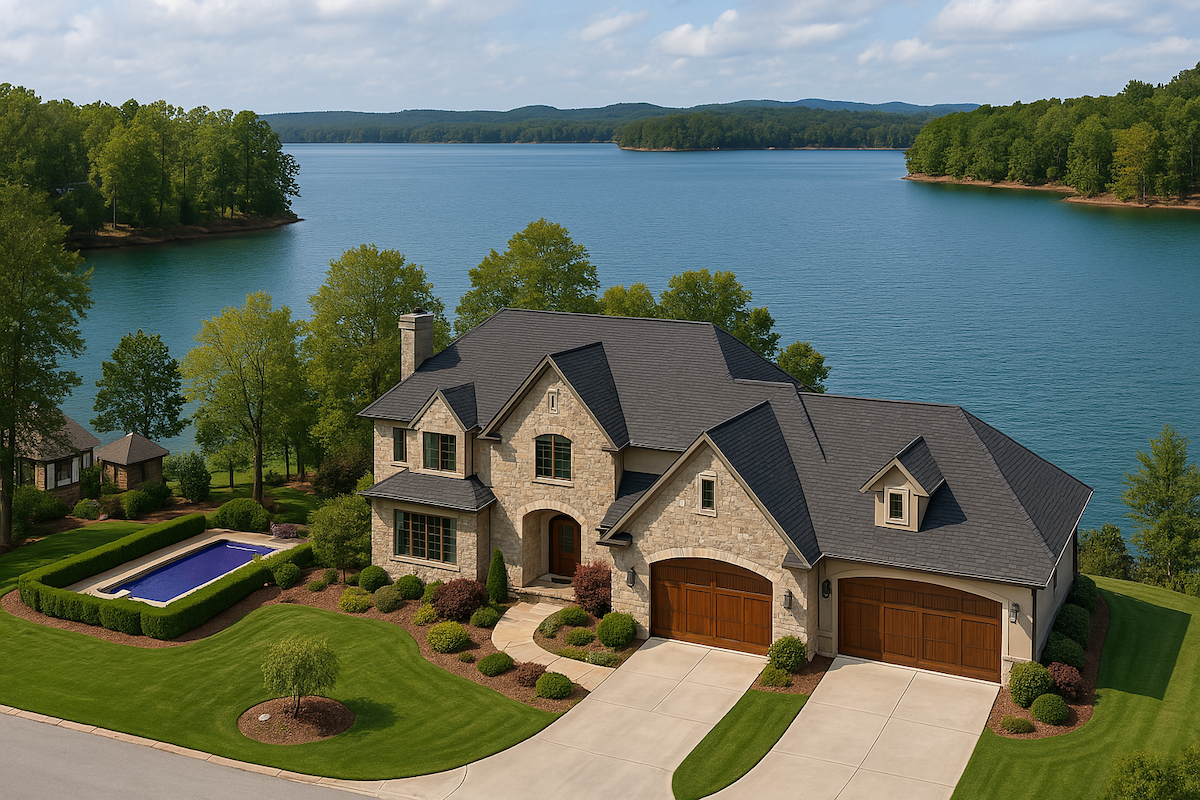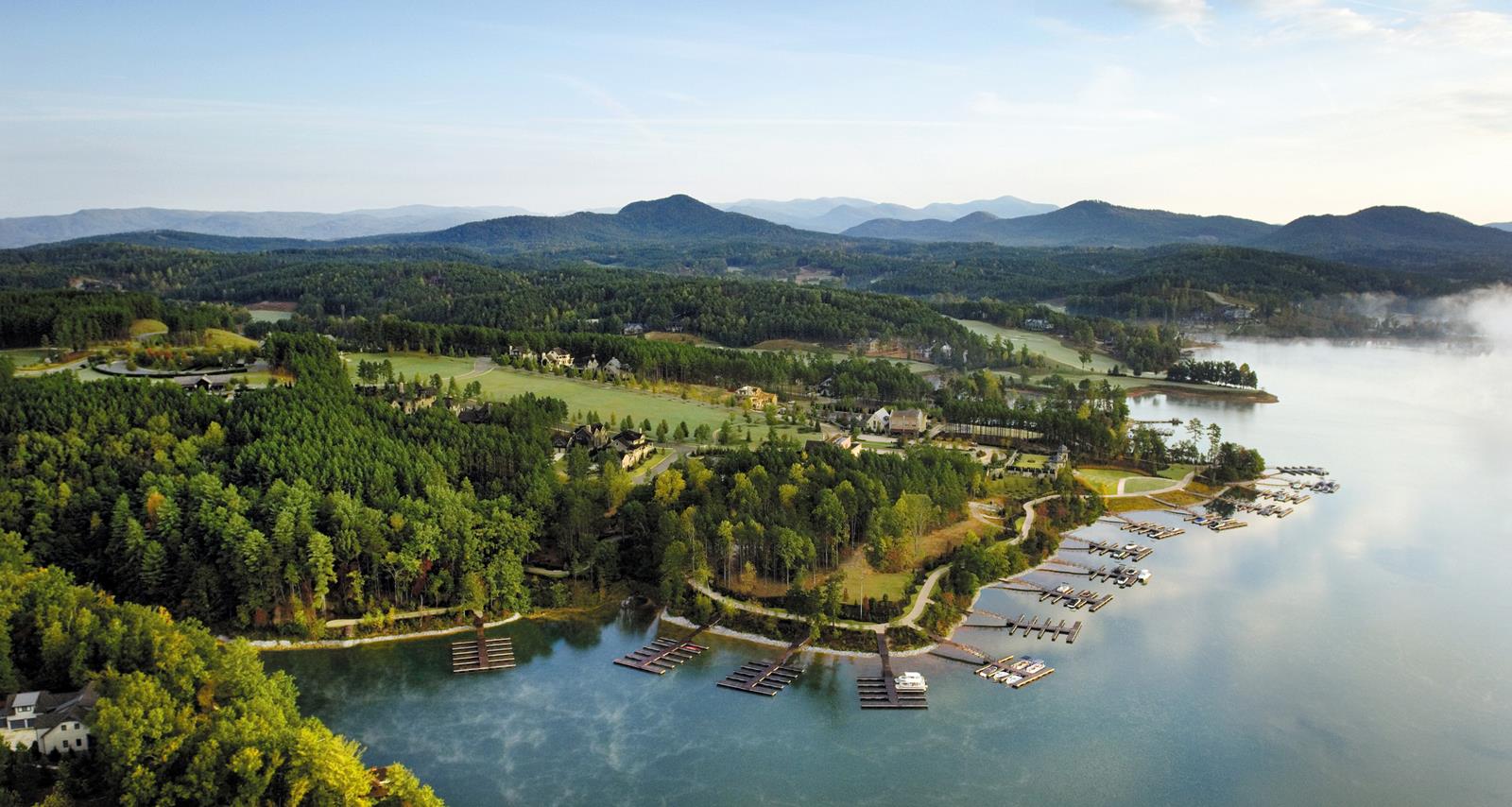There’s a reason lakefront property on Lake Keowee is some of the most sought-after real estate not just in South Carolina, but across the entire Southeastern United States—and it’s not just about the pretty views and weekend boating. We’re talking about a lifestyle investment. A place where mornings start on the dock with coffee in hand and end with a sunset glimmering off deep, clean water. A place that balances nature with luxury.
Now, it’s easy to get swept up in the fantasy—but if you’re seriously in the market for a home on Keowee with a dock, you need more than daydreams. You need strategy.
That’s because not every lakefront home qualifies for a dock. Not every dock is private. Not every shoreline gets you the kind of access you’re imagining. And if you don’t know the difference between dock-permitted and dock-possible—or what Duke Energy has to do with your backyard—you could end up with a waterfront view and nowhere to park your boat.

Today, we’ll walk you through the types of homes that actually come with dock access, the neighborhoods that offer the best opportunities, what the permitting process looks like, and what to watch out for before you sign on the dotted line. Whether you’re an avid fisherman, a part-time pontoon captain, or someone looking for a generational property that just happens to be waterfront—this is how you shop for waterfront homes for sale with a dock on Lake Keowee.
Why the Dock Comes First for Many Home Buyers
For many buyers, a dock is a must-have. It’s the focal point. It’s your front porch, your boat garage, your morning sanctuary, your evening social club.
It’s where the fish bite, where the kids jump in, where the wine glasses clink, and where the whole reason for living on the lake really comes to life.
You can have all the granite countertops and cathedral ceilings in the world, but without a dock? You’re watching lake life happen instead of living it.
For lifelong fishermen, it means walking straight from the kitchen to the boat without ever turning a key in your truck. For boaters, it’s the difference between spur-of-the-moment cruising and trailer-hauling chores.
And for those of us who believe a quiet coffee by the water is better than a dozen therapy sessions, it’s peace you can’t put a price on. Simply put, your dock becomes a big part of how you live at the lake.

Here’s what having a home with a dock unlocks for you:
- Boat Access: No more trailering your boat to a public launch.
- Increased Property Value: Waterfront homes with private docks typically command premium prices.
- Daily Convenience: Swim, kayak, or fish without leaving your backyard.
- Social Space: Many docks serve as casual gathering spots with built-in seating or upper decks.
Types of Dock Access on Lake Keowee

Not all docks are created equal—and not every home that hugs the shoreline is entitled to one. That’s an important thing to be aware of if you’re already picturing yourself casting lines off the edge of your private platform or tying off a pontoon after a sunset cruise.
It’s important to know whether your lakefront dream home includes a legal spot to build or maintain a dock. Here are some of the types of docks you’ll find when you’re house shopping on Lake Keowee:
1. Private Dock
- Fully owned and maintained by the homeowner.
- Typically found on large, single-family properties with direct shoreline access.
- Requires permit approval from Duke Energy (the lake’s manager).
2. Shared or Community Dock
- Common in gated communities or townhome developments.
- May involve usage rules or limited slip access.
- HOA fees usually cover maintenance.
3. Dock-Eligible Lots (No Dock Yet)
- May be cheaper upfront but require time, permitting, and investment.
- Important to verify that the property is indeed eligible for a dock permit before purchasing.
What Affects Whether a Property Can Have a Dock?

Duke Energy governs shoreline management for Lake Keowee. Even if a home sits on the water, that doesn’t mean it’s guaranteed to be dock-permitted.
Here’s what they consider:
- Shoreline Classification: Some parts of the lake are protected or restricted.
- Water Depth: Docks must extend to a certain depth for safety and usability.
- Lot Size & Frontage: A narrow lot may not meet setback rules.
- Existing Dock Density: In some coves, the number of docks is already maxed out.
Pro Tip: Always verify dock eligibility in writing before making an offer. A local real estate agent familiar with Duke Energy’s permit system can help navigate this.
Where to Look: The Most Sought-After Areas for Homes with Docks
Lake Keowee is dotted with communities, coves, and quiet stretches—but some areas are particularly known for having dock-friendly properties:
📍 Keowee Key
- An upscale, gated golf and boating community with both private and shared dock homes.
- POA-maintained amenities with a strong resale market.
- only a short drive to Seneca for shopping, dining, and services,
📍 The Cliffs Communities (e.g., Cliffs at Keowee Springs, Vineyards, Falls North & Falls South)
- Luxury estates with custom docks and resort-style living.
- Ideal if you want architectural beauty and boat access.
📍 Seneca Side / North Lake Keowee
- Offers a mix of newer builds and classic lake homes, many with existing boat docks.
- Close to shopping, dining, and healthcare in town.
📍 South Lake (near Keowee Marina)
- Great if you want full-service marina access nearby without maintaining your own dock.
- Some newer developments offer dock-ready lots with room to build.
Dock vs. Boat Slip: What’s the Difference?

If you’re shopping Lake Keowee real estate, you’ll hear both terms—dock and boat slip—used frequently, sometimes interchangeably. But they’re not the same, and knowing the difference can shape what kind of property you pursue.
- A dock is the full structure extending into the water from the shoreline. Think of it as the platform—often outfitted with railings, lighting, seating, or even a rooftop deck—that gives you access to the lake. It can serve multiple purposes: launching paddleboards, fishing, swimming, or relaxing with a drink.
- A boat slip is a designated parking space within the dock for your boat. It may be open, covered, or equipped with a lift system. Some docks have one slip, some have several, and in communities, slips may be individually assigned or shared.
Private waterfront homes often include both, but shared community docks usually assign slips by deed or lease. Always verify what’s included—because having a dock without a slip is like relying on temporary street parking instead of having a garage and driveway—you can still park and use it, but you don’t have a dedicated, protected space for your vehicle (or in this case, your boat).
Other Common Questions
💬 Can I add a dock after buying the home?
Possibly. You’ll need to apply for a permit from Duke Energy, and not all properties qualify. Always check eligibility before you buy.
💬 Are floating docks allowed on Lake Keowee?
Yes, most private docks are floating and anchored to the shoreline. However, their design must meet Duke’s shoreline management guidelines.
💬 Do homes with a dock cost more?
In general, yes—especially those with deepwater access and permitted private docks. You’re paying for both lifestyle and limited availability.
💬 Can docks be covered or have upper decks?
Yes, with a special permit and if water depth and shoreline conditions allow. This varies by location.
What to Look for in a Docked Property

Once you’re out walking properties—feet on the ground, breathing in that crisp Keowee air—it’s easy to get caught up in the charm of the lake itself. But if you’re serious about buying a home with a dock, this is where the due diligence really counts. Because long after the open house cookies are gone and the view loses its novelty, your dock is what turns this from a pretty postcard into a functioning lifestyle.
When touring Lake Keowee homes for sale with docks, pay attention to:
- Water Depth: At least 8–10 ft for year-round boating.
- Dock Condition: Look for rust, rot, or needed repairs.
- Shoreline Erosion Control: Riprap or seawalls prevent long-term property damage.
- Orientation: Western-facing docks enjoy sunset views but may get hot in summer.
| ✅ Check shoreline permit status |
| ✅ Confirm water depth at full and low lake levels |
| ✅ Get dock inspected separately |
| ✅ Budget for dock maintenance or upgrades |
| ✅ Work with locally-based Lake Keowee real estate agents like The Cason Group who are familar with our local permitting processes |
“Lake Kiwi” Fact: Duke Energy manages the lake, including water levels, which are adjusted throughout the year for power generation and environmental balance. It’s a well-run system. Duke Energy has to keep the water levels within a tight, regulated range so the Oconee power plant runs safely. For homeowners, that’s good news: You’re not dealing with wild water swings like some other lakefront properties in South Carolina and the rest of the U.S.
Financing and Insurance for Docked Lake Keowee Homes
- Waterfront premiums: Expect higher purchase prices and property taxes.
- Dock insurance: Often needs to be added as a rider to your homeowner’s policy.
- Flood insurance: Rarely required here due to lake elevation and management, but check your lender’s requirements.
Working with a Lake Keowee Real Estate Agent
Buying a lakefront home is different from a typical residential purchase. You’ll want an agent who:
- Knows Duke Energy’s dock permitting process
- Has access to pocket listings that may not be on Zillow
- Understands shoreline classifications and lake-specific restrictions
A good local agent isn’t just a salesperson—they’re your translator for how Lake Keowee really works.
Final Thoughts: Is a Home with a Dock Worth It?

If lake life is your long-term plan, the short answer is: yes. Homes with existing docks are convenient, high-value, and hard to come by. But the process of buying one isn’t something you want to go into blind. With preparation, the right real estate agent, and patience, you can find Lake Keowee luxury properties for sale that fit your lifestyle today—and ultimately you’ll find a property that feels like it was built just for you—and keeps paying off every time the boat leaves the slip.